Analyzing the Beveridge Report and Development of the UK Welfare State
VerifiedAdded on 2023/04/08
|12
|2427
|184
Essay
AI Summary
This essay provides a comprehensive analysis of the Beveridge Report and its profound impact on the development of the welfare state in the United Kingdom. Beginning with an overview of the factors leading to the establishment of the welfare state, the essay outlines its founding principles and delves into the specifics of the Beveridge Report, including its identification of the 'five giants': idleness, ignorance, squalor, disease, and want. The essay then examines how these giants were addressed through legislation and governmental ideologies, comparing various policy changes and techniques implemented over time. A detailed analysis of three of the five giants—diseases, ignorance, and idleness—is presented, highlighting the progress made and the challenges that persist. The conclusion emphasizes the Beveridge Report's foundational role in shaping the UK's national health and insurance services, ultimately contributing to the reduction of poverty and improvement of living conditions. The timeline provides a concise overview of the key developmental stages of the welfare state in the UK, from the introduction of the Poor Law Act in 1834 to the formation of the Poor Law Board in 1847.
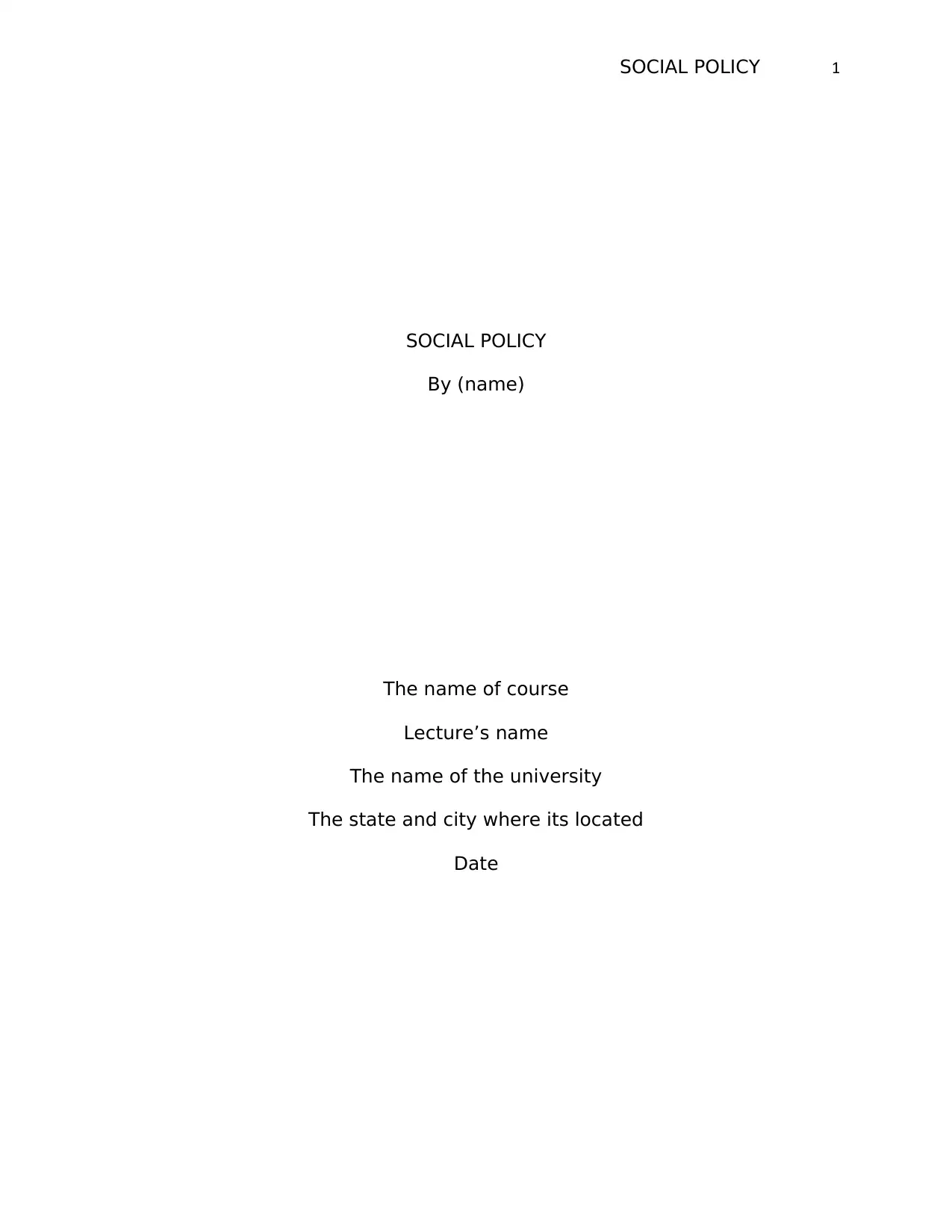
SOCIAL POLICY 1
SOCIAL POLICY
By (name)
The name of course
Lecture’s name
The name of the university
The state and city where its located
Date
SOCIAL POLICY
By (name)
The name of course
Lecture’s name
The name of the university
The state and city where its located
Date
Paraphrase This Document
Need a fresh take? Get an instant paraphrase of this document with our AI Paraphraser
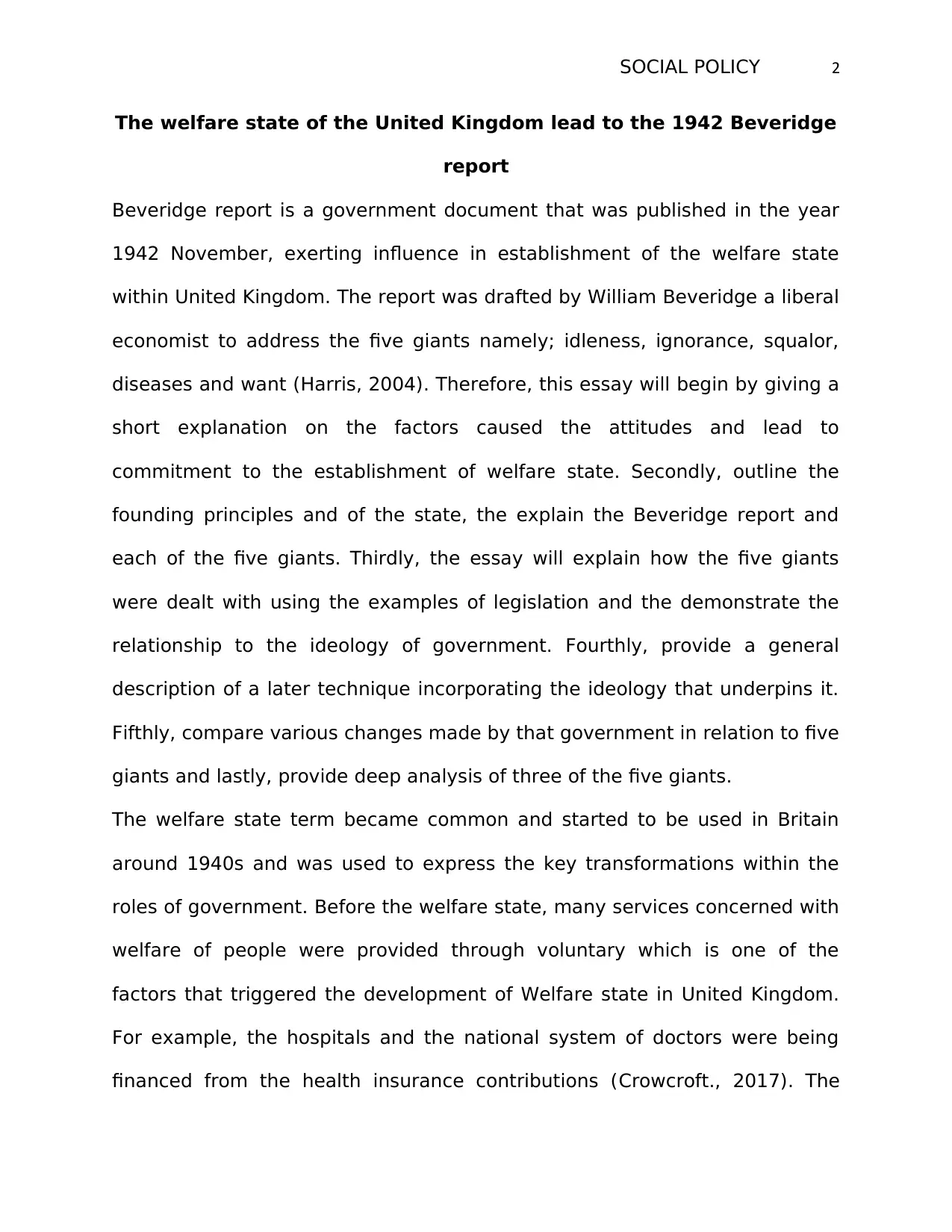
SOCIAL POLICY 2
The welfare state of the United Kingdom lead to the 1942 Beveridge
report
Beveridge report is a government document that was published in the year
1942 November, exerting influence in establishment of the welfare state
within United Kingdom. The report was drafted by William Beveridge a liberal
economist to address the five giants namely; idleness, ignorance, squalor,
diseases and want (Harris, 2004). Therefore, this essay will begin by giving a
short explanation on the factors caused the attitudes and lead to
commitment to the establishment of welfare state. Secondly, outline the
founding principles and of the state, the explain the Beveridge report and
each of the five giants. Thirdly, the essay will explain how the five giants
were dealt with using the examples of legislation and the demonstrate the
relationship to the ideology of government. Fourthly, provide a general
description of a later technique incorporating the ideology that underpins it.
Fifthly, compare various changes made by that government in relation to five
giants and lastly, provide deep analysis of three of the five giants.
The welfare state term became common and started to be used in Britain
around 1940s and was used to express the key transformations within the
roles of government. Before the welfare state, many services concerned with
welfare of people were provided through voluntary which is one of the
factors that triggered the development of Welfare state in United Kingdom.
For example, the hospitals and the national system of doctors were being
financed from the health insurance contributions (Crowcroft., 2017). The
The welfare state of the United Kingdom lead to the 1942 Beveridge
report
Beveridge report is a government document that was published in the year
1942 November, exerting influence in establishment of the welfare state
within United Kingdom. The report was drafted by William Beveridge a liberal
economist to address the five giants namely; idleness, ignorance, squalor,
diseases and want (Harris, 2004). Therefore, this essay will begin by giving a
short explanation on the factors caused the attitudes and lead to
commitment to the establishment of welfare state. Secondly, outline the
founding principles and of the state, the explain the Beveridge report and
each of the five giants. Thirdly, the essay will explain how the five giants
were dealt with using the examples of legislation and the demonstrate the
relationship to the ideology of government. Fourthly, provide a general
description of a later technique incorporating the ideology that underpins it.
Fifthly, compare various changes made by that government in relation to five
giants and lastly, provide deep analysis of three of the five giants.
The welfare state term became common and started to be used in Britain
around 1940s and was used to express the key transformations within the
roles of government. Before the welfare state, many services concerned with
welfare of people were provided through voluntary which is one of the
factors that triggered the development of Welfare state in United Kingdom.
For example, the hospitals and the national system of doctors were being
financed from the health insurance contributions (Crowcroft., 2017). The
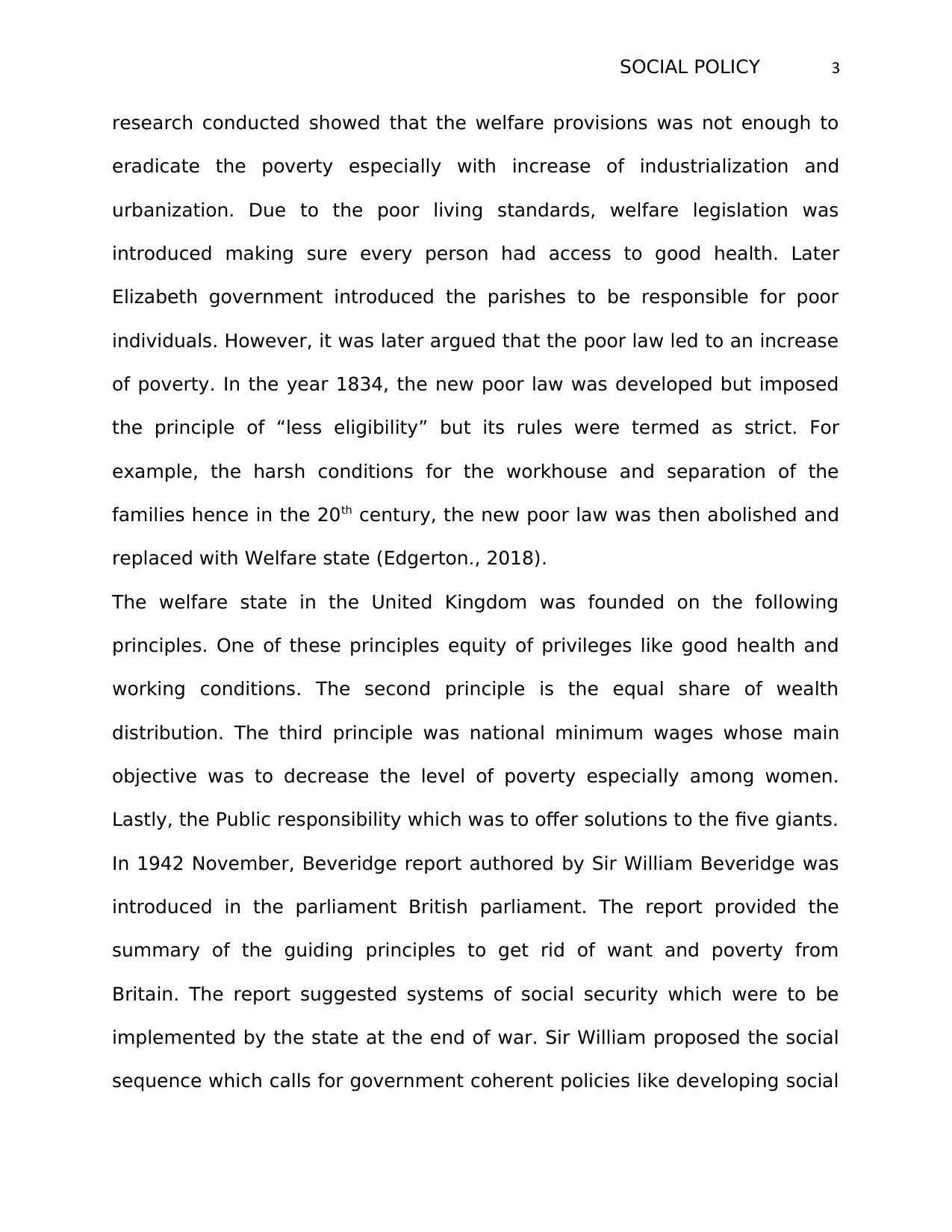
SOCIAL POLICY 3
research conducted showed that the welfare provisions was not enough to
eradicate the poverty especially with increase of industrialization and
urbanization. Due to the poor living standards, welfare legislation was
introduced making sure every person had access to good health. Later
Elizabeth government introduced the parishes to be responsible for poor
individuals. However, it was later argued that the poor law led to an increase
of poverty. In the year 1834, the new poor law was developed but imposed
the principle of “less eligibility” but its rules were termed as strict. For
example, the harsh conditions for the workhouse and separation of the
families hence in the 20th century, the new poor law was then abolished and
replaced with Welfare state (Edgerton., 2018).
The welfare state in the United Kingdom was founded on the following
principles. One of these principles equity of privileges like good health and
working conditions. The second principle is the equal share of wealth
distribution. The third principle was national minimum wages whose main
objective was to decrease the level of poverty especially among women.
Lastly, the Public responsibility which was to offer solutions to the five giants.
In 1942 November, Beveridge report authored by Sir William Beveridge was
introduced in the parliament British parliament. The report provided the
summary of the guiding principles to get rid of want and poverty from
Britain. The report suggested systems of social security which were to be
implemented by the state at the end of war. Sir William proposed the social
sequence which calls for government coherent policies like developing social
research conducted showed that the welfare provisions was not enough to
eradicate the poverty especially with increase of industrialization and
urbanization. Due to the poor living standards, welfare legislation was
introduced making sure every person had access to good health. Later
Elizabeth government introduced the parishes to be responsible for poor
individuals. However, it was later argued that the poor law led to an increase
of poverty. In the year 1834, the new poor law was developed but imposed
the principle of “less eligibility” but its rules were termed as strict. For
example, the harsh conditions for the workhouse and separation of the
families hence in the 20th century, the new poor law was then abolished and
replaced with Welfare state (Edgerton., 2018).
The welfare state in the United Kingdom was founded on the following
principles. One of these principles equity of privileges like good health and
working conditions. The second principle is the equal share of wealth
distribution. The third principle was national minimum wages whose main
objective was to decrease the level of poverty especially among women.
Lastly, the Public responsibility which was to offer solutions to the five giants.
In 1942 November, Beveridge report authored by Sir William Beveridge was
introduced in the parliament British parliament. The report provided the
summary of the guiding principles to get rid of want and poverty from
Britain. The report suggested systems of social security which were to be
implemented by the state at the end of war. Sir William proposed the social
sequence which calls for government coherent policies like developing social
⊘ This is a preview!⊘
Do you want full access?
Subscribe today to unlock all pages.

Trusted by 1+ million students worldwide
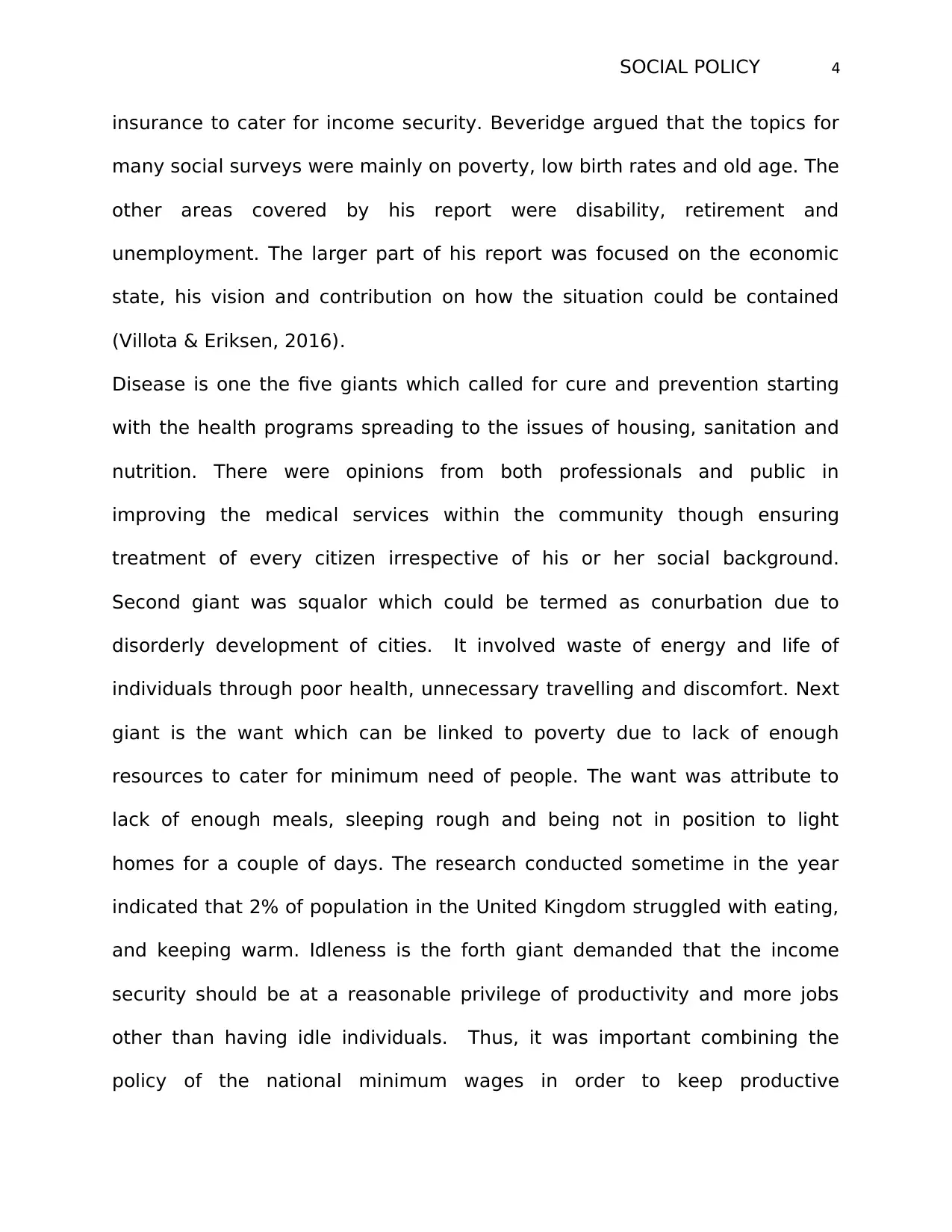
SOCIAL POLICY 4
insurance to cater for income security. Beveridge argued that the topics for
many social surveys were mainly on poverty, low birth rates and old age. The
other areas covered by his report were disability, retirement and
unemployment. The larger part of his report was focused on the economic
state, his vision and contribution on how the situation could be contained
(Villota & Eriksen, 2016).
Disease is one the five giants which called for cure and prevention starting
with the health programs spreading to the issues of housing, sanitation and
nutrition. There were opinions from both professionals and public in
improving the medical services within the community though ensuring
treatment of every citizen irrespective of his or her social background.
Second giant was squalor which could be termed as conurbation due to
disorderly development of cities. It involved waste of energy and life of
individuals through poor health, unnecessary travelling and discomfort. Next
giant is the want which can be linked to poverty due to lack of enough
resources to cater for minimum need of people. The want was attribute to
lack of enough meals, sleeping rough and being not in position to light
homes for a couple of days. The research conducted sometime in the year
indicated that 2% of population in the United Kingdom struggled with eating,
and keeping warm. Idleness is the forth giant demanded that the income
security should be at a reasonable privilege of productivity and more jobs
other than having idle individuals. Thus, it was important combining the
policy of the national minimum wages in order to keep productive
insurance to cater for income security. Beveridge argued that the topics for
many social surveys were mainly on poverty, low birth rates and old age. The
other areas covered by his report were disability, retirement and
unemployment. The larger part of his report was focused on the economic
state, his vision and contribution on how the situation could be contained
(Villota & Eriksen, 2016).
Disease is one the five giants which called for cure and prevention starting
with the health programs spreading to the issues of housing, sanitation and
nutrition. There were opinions from both professionals and public in
improving the medical services within the community though ensuring
treatment of every citizen irrespective of his or her social background.
Second giant was squalor which could be termed as conurbation due to
disorderly development of cities. It involved waste of energy and life of
individuals through poor health, unnecessary travelling and discomfort. Next
giant is the want which can be linked to poverty due to lack of enough
resources to cater for minimum need of people. The want was attribute to
lack of enough meals, sleeping rough and being not in position to light
homes for a couple of days. The research conducted sometime in the year
indicated that 2% of population in the United Kingdom struggled with eating,
and keeping warm. Idleness is the forth giant demanded that the income
security should be at a reasonable privilege of productivity and more jobs
other than having idle individuals. Thus, it was important combining the
policy of the national minimum wages in order to keep productive
Paraphrase This Document
Need a fresh take? Get an instant paraphrase of this document with our AI Paraphraser
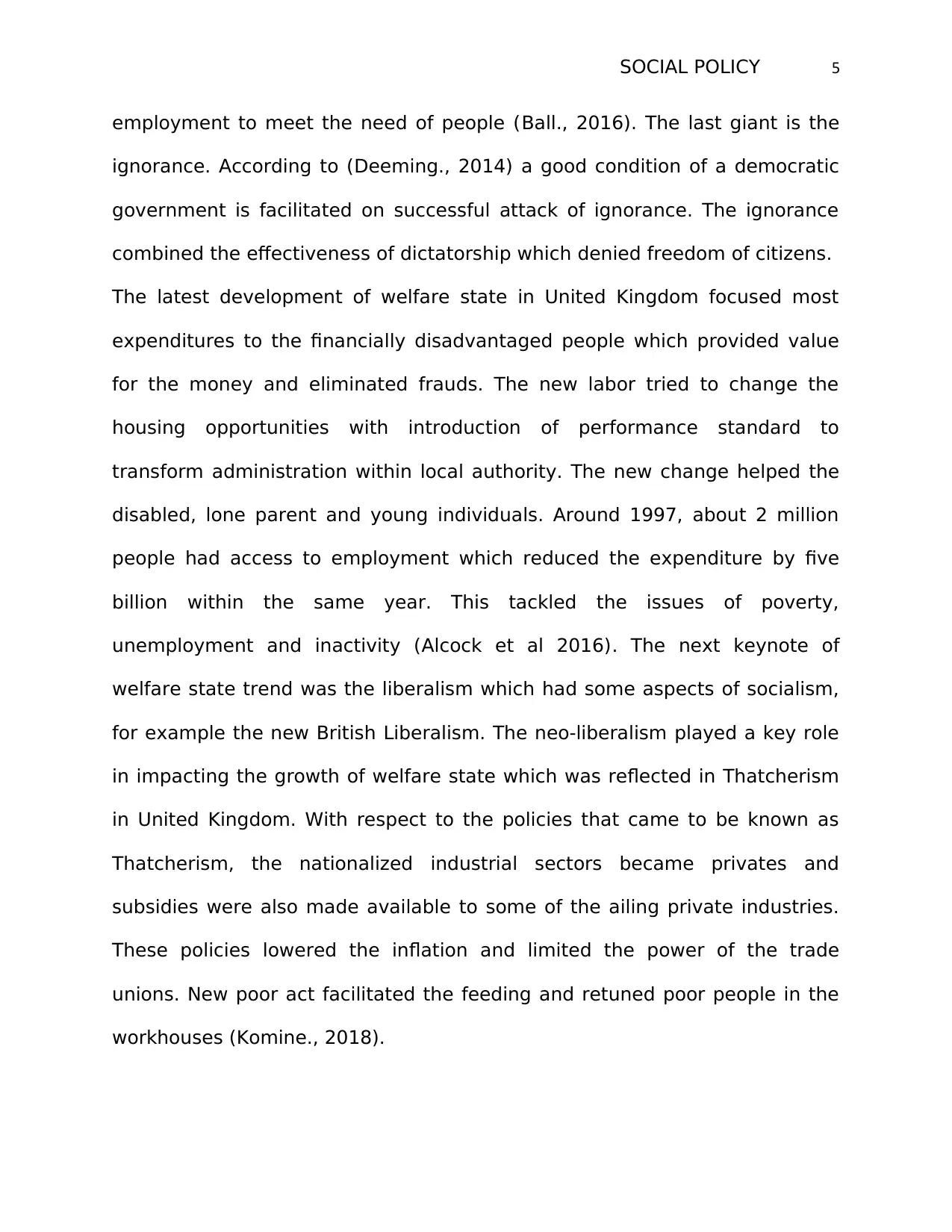
SOCIAL POLICY 5
employment to meet the need of people (Ball., 2016). The last giant is the
ignorance. According to (Deeming., 2014) a good condition of a democratic
government is facilitated on successful attack of ignorance. The ignorance
combined the effectiveness of dictatorship which denied freedom of citizens.
The latest development of welfare state in United Kingdom focused most
expenditures to the financially disadvantaged people which provided value
for the money and eliminated frauds. The new labor tried to change the
housing opportunities with introduction of performance standard to
transform administration within local authority. The new change helped the
disabled, lone parent and young individuals. Around 1997, about 2 million
people had access to employment which reduced the expenditure by five
billion within the same year. This tackled the issues of poverty,
unemployment and inactivity (Alcock et al 2016). The next keynote of
welfare state trend was the liberalism which had some aspects of socialism,
for example the new British Liberalism. The neo-liberalism played a key role
in impacting the growth of welfare state which was reflected in Thatcherism
in United Kingdom. With respect to the policies that came to be known as
Thatcherism, the nationalized industrial sectors became privates and
subsidies were also made available to some of the ailing private industries.
These policies lowered the inflation and limited the power of the trade
unions. New poor act facilitated the feeding and retuned poor people in the
workhouses (Komine., 2018).
employment to meet the need of people (Ball., 2016). The last giant is the
ignorance. According to (Deeming., 2014) a good condition of a democratic
government is facilitated on successful attack of ignorance. The ignorance
combined the effectiveness of dictatorship which denied freedom of citizens.
The latest development of welfare state in United Kingdom focused most
expenditures to the financially disadvantaged people which provided value
for the money and eliminated frauds. The new labor tried to change the
housing opportunities with introduction of performance standard to
transform administration within local authority. The new change helped the
disabled, lone parent and young individuals. Around 1997, about 2 million
people had access to employment which reduced the expenditure by five
billion within the same year. This tackled the issues of poverty,
unemployment and inactivity (Alcock et al 2016). The next keynote of
welfare state trend was the liberalism which had some aspects of socialism,
for example the new British Liberalism. The neo-liberalism played a key role
in impacting the growth of welfare state which was reflected in Thatcherism
in United Kingdom. With respect to the policies that came to be known as
Thatcherism, the nationalized industrial sectors became privates and
subsidies were also made available to some of the ailing private industries.
These policies lowered the inflation and limited the power of the trade
unions. New poor act facilitated the feeding and retuned poor people in the
workhouses (Komine., 2018).
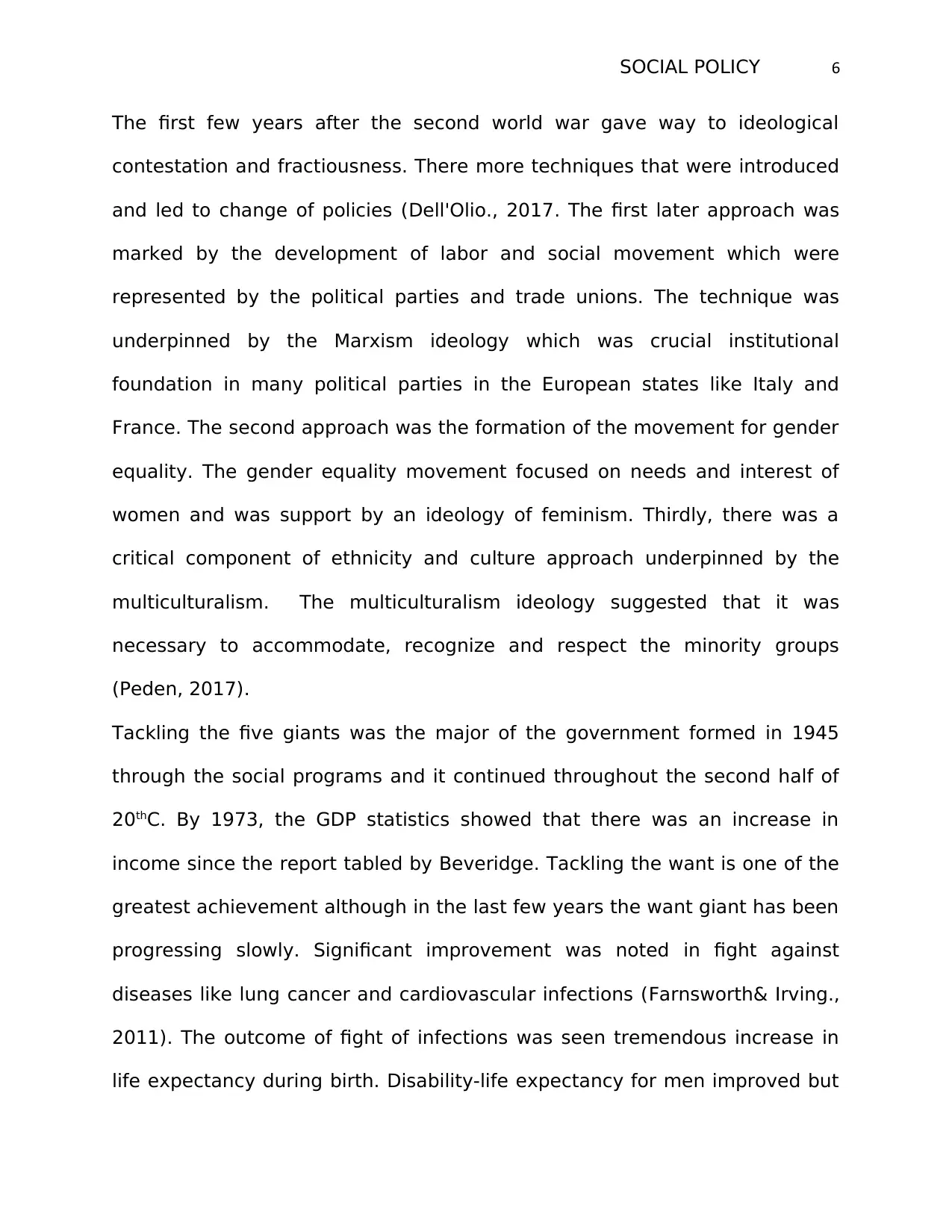
SOCIAL POLICY 6
The first few years after the second world war gave way to ideological
contestation and fractiousness. There more techniques that were introduced
and led to change of policies (Dell'Olio., 2017. The first later approach was
marked by the development of labor and social movement which were
represented by the political parties and trade unions. The technique was
underpinned by the Marxism ideology which was crucial institutional
foundation in many political parties in the European states like Italy and
France. The second approach was the formation of the movement for gender
equality. The gender equality movement focused on needs and interest of
women and was support by an ideology of feminism. Thirdly, there was a
critical component of ethnicity and culture approach underpinned by the
multiculturalism. The multiculturalism ideology suggested that it was
necessary to accommodate, recognize and respect the minority groups
(Peden, 2017).
Tackling the five giants was the major of the government formed in 1945
through the social programs and it continued throughout the second half of
20thC. By 1973, the GDP statistics showed that there was an increase in
income since the report tabled by Beveridge. Tackling the want is one of the
greatest achievement although in the last few years the want giant has been
progressing slowly. Significant improvement was noted in fight against
diseases like lung cancer and cardiovascular infections (Farnsworth& Irving.,
2011). The outcome of fight of infections was seen tremendous increase in
life expectancy during birth. Disability-life expectancy for men improved but
The first few years after the second world war gave way to ideological
contestation and fractiousness. There more techniques that were introduced
and led to change of policies (Dell'Olio., 2017. The first later approach was
marked by the development of labor and social movement which were
represented by the political parties and trade unions. The technique was
underpinned by the Marxism ideology which was crucial institutional
foundation in many political parties in the European states like Italy and
France. The second approach was the formation of the movement for gender
equality. The gender equality movement focused on needs and interest of
women and was support by an ideology of feminism. Thirdly, there was a
critical component of ethnicity and culture approach underpinned by the
multiculturalism. The multiculturalism ideology suggested that it was
necessary to accommodate, recognize and respect the minority groups
(Peden, 2017).
Tackling the five giants was the major of the government formed in 1945
through the social programs and it continued throughout the second half of
20thC. By 1973, the GDP statistics showed that there was an increase in
income since the report tabled by Beveridge. Tackling the want is one of the
greatest achievement although in the last few years the want giant has been
progressing slowly. Significant improvement was noted in fight against
diseases like lung cancer and cardiovascular infections (Farnsworth& Irving.,
2011). The outcome of fight of infections was seen tremendous increase in
life expectancy during birth. Disability-life expectancy for men improved but
⊘ This is a preview!⊘
Do you want full access?
Subscribe today to unlock all pages.

Trusted by 1+ million students worldwide
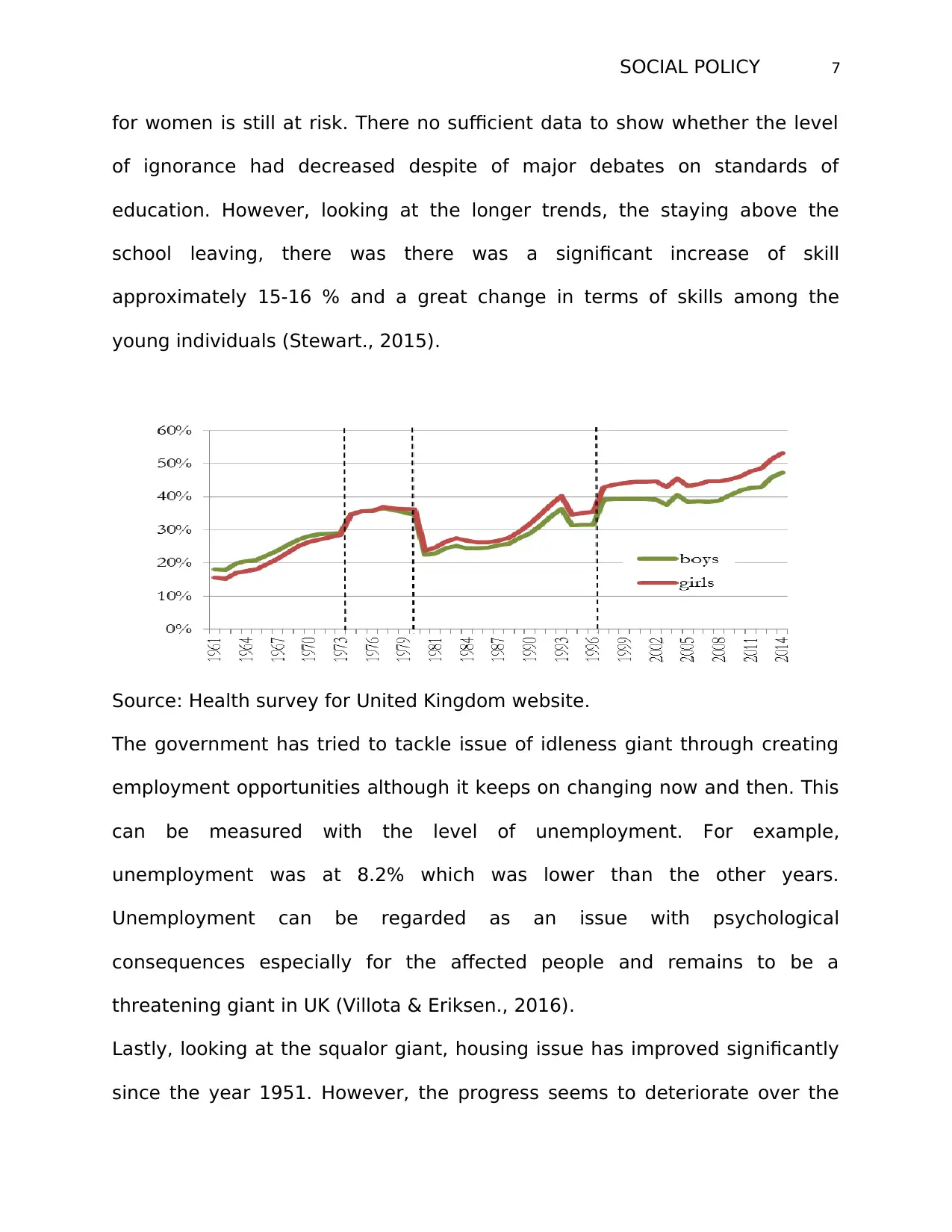
SOCIAL POLICY 7
for women is still at risk. There no sufficient data to show whether the level
of ignorance had decreased despite of major debates on standards of
education. However, looking at the longer trends, the staying above the
school leaving, there was there was a significant increase of skill
approximately 15-16 % and a great change in terms of skills among the
young individuals (Stewart., 2015).
Source: Health survey for United Kingdom website.
The government has tried to tackle issue of idleness giant through creating
employment opportunities although it keeps on changing now and then. This
can be measured with the level of unemployment. For example,
unemployment was at 8.2% which was lower than the other years.
Unemployment can be regarded as an issue with psychological
consequences especially for the affected people and remains to be a
threatening giant in UK (Villota & Eriksen., 2016).
Lastly, looking at the squalor giant, housing issue has improved significantly
since the year 1951. However, the progress seems to deteriorate over the
for women is still at risk. There no sufficient data to show whether the level
of ignorance had decreased despite of major debates on standards of
education. However, looking at the longer trends, the staying above the
school leaving, there was there was a significant increase of skill
approximately 15-16 % and a great change in terms of skills among the
young individuals (Stewart., 2015).
Source: Health survey for United Kingdom website.
The government has tried to tackle issue of idleness giant through creating
employment opportunities although it keeps on changing now and then. This
can be measured with the level of unemployment. For example,
unemployment was at 8.2% which was lower than the other years.
Unemployment can be regarded as an issue with psychological
consequences especially for the affected people and remains to be a
threatening giant in UK (Villota & Eriksen., 2016).
Lastly, looking at the squalor giant, housing issue has improved significantly
since the year 1951. However, the progress seems to deteriorate over the
Paraphrase This Document
Need a fresh take? Get an instant paraphrase of this document with our AI Paraphraser
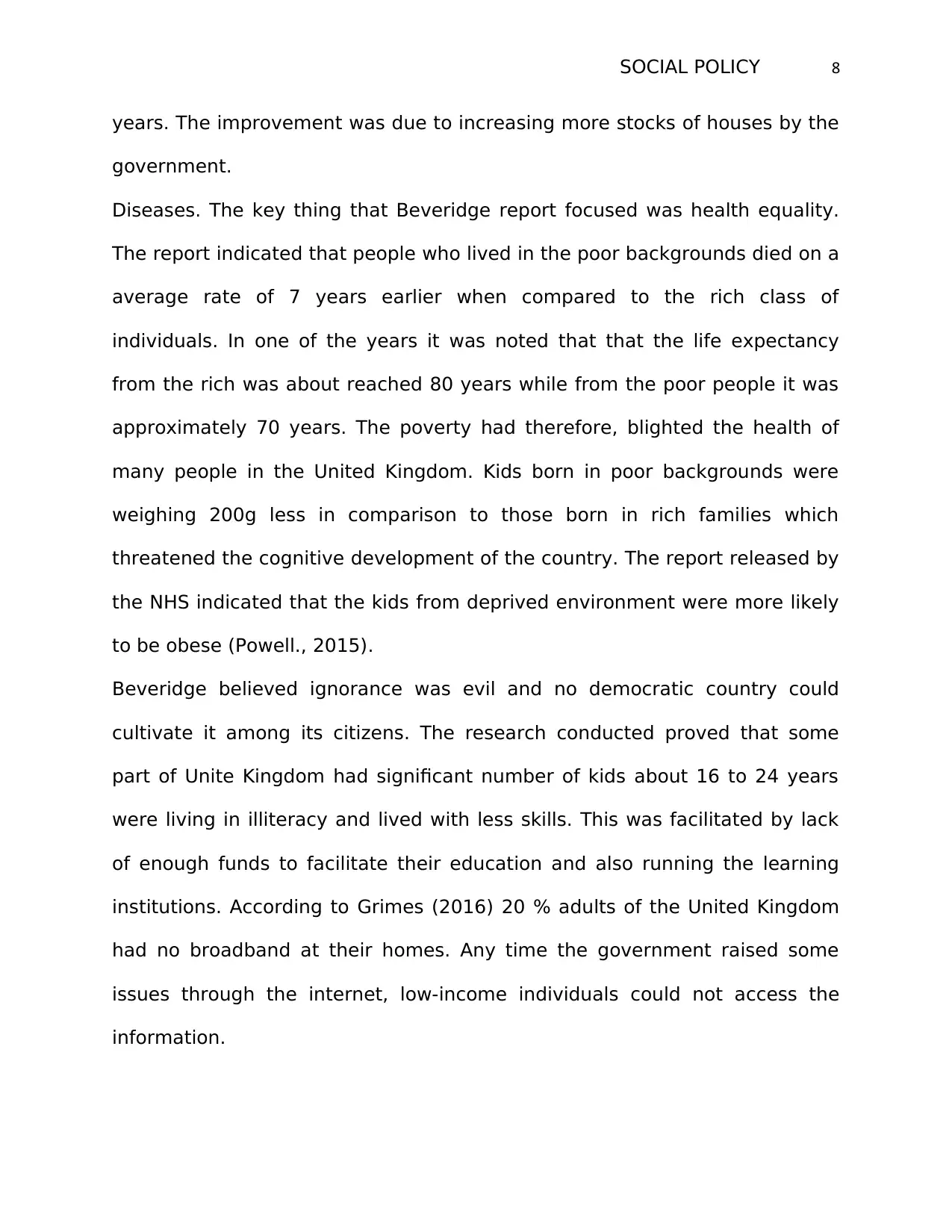
SOCIAL POLICY 8
years. The improvement was due to increasing more stocks of houses by the
government.
Diseases. The key thing that Beveridge report focused was health equality.
The report indicated that people who lived in the poor backgrounds died on a
average rate of 7 years earlier when compared to the rich class of
individuals. In one of the years it was noted that that the life expectancy
from the rich was about reached 80 years while from the poor people it was
approximately 70 years. The poverty had therefore, blighted the health of
many people in the United Kingdom. Kids born in poor backgrounds were
weighing 200g less in comparison to those born in rich families which
threatened the cognitive development of the country. The report released by
the NHS indicated that the kids from deprived environment were more likely
to be obese (Powell., 2015).
Beveridge believed ignorance was evil and no democratic country could
cultivate it among its citizens. The research conducted proved that some
part of Unite Kingdom had significant number of kids about 16 to 24 years
were living in illiteracy and lived with less skills. This was facilitated by lack
of enough funds to facilitate their education and also running the learning
institutions. According to Grimes (2016) 20 % adults of the United Kingdom
had no broadband at their homes. Any time the government raised some
issues through the internet, low-income individuals could not access the
information.
years. The improvement was due to increasing more stocks of houses by the
government.
Diseases. The key thing that Beveridge report focused was health equality.
The report indicated that people who lived in the poor backgrounds died on a
average rate of 7 years earlier when compared to the rich class of
individuals. In one of the years it was noted that that the life expectancy
from the rich was about reached 80 years while from the poor people it was
approximately 70 years. The poverty had therefore, blighted the health of
many people in the United Kingdom. Kids born in poor backgrounds were
weighing 200g less in comparison to those born in rich families which
threatened the cognitive development of the country. The report released by
the NHS indicated that the kids from deprived environment were more likely
to be obese (Powell., 2015).
Beveridge believed ignorance was evil and no democratic country could
cultivate it among its citizens. The research conducted proved that some
part of Unite Kingdom had significant number of kids about 16 to 24 years
were living in illiteracy and lived with less skills. This was facilitated by lack
of enough funds to facilitate their education and also running the learning
institutions. According to Grimes (2016) 20 % adults of the United Kingdom
had no broadband at their homes. Any time the government raised some
issues through the internet, low-income individuals could not access the
information.
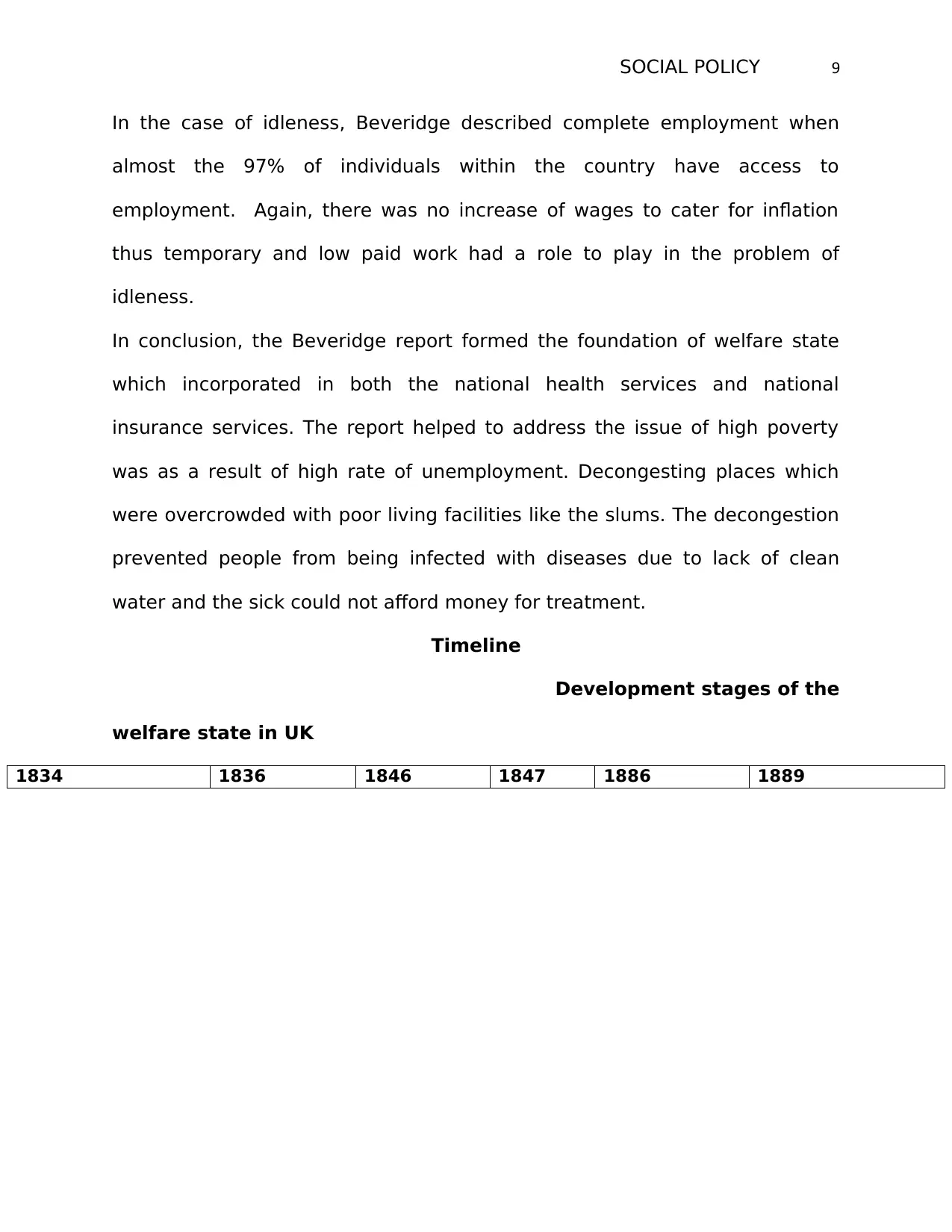
SOCIAL POLICY 9
In the case of idleness, Beveridge described complete employment when
almost the 97% of individuals within the country have access to
employment. Again, there was no increase of wages to cater for inflation
thus temporary and low paid work had a role to play in the problem of
idleness.
In conclusion, the Beveridge report formed the foundation of welfare state
which incorporated in both the national health services and national
insurance services. The report helped to address the issue of high poverty
was as a result of high rate of unemployment. Decongesting places which
were overcrowded with poor living facilities like the slums. The decongestion
prevented people from being infected with diseases due to lack of clean
water and the sick could not afford money for treatment.
Timeline
Development stages of the
welfare state in UK
1834 1836 1846 1847 1886 1889
In the case of idleness, Beveridge described complete employment when
almost the 97% of individuals within the country have access to
employment. Again, there was no increase of wages to cater for inflation
thus temporary and low paid work had a role to play in the problem of
idleness.
In conclusion, the Beveridge report formed the foundation of welfare state
which incorporated in both the national health services and national
insurance services. The report helped to address the issue of high poverty
was as a result of high rate of unemployment. Decongesting places which
were overcrowded with poor living facilities like the slums. The decongestion
prevented people from being infected with diseases due to lack of clean
water and the sick could not afford money for treatment.
Timeline
Development stages of the
welfare state in UK
1834 1836 1846 1847 1886 1889
⊘ This is a preview!⊘
Do you want full access?
Subscribe today to unlock all pages.

Trusted by 1+ million students worldwide
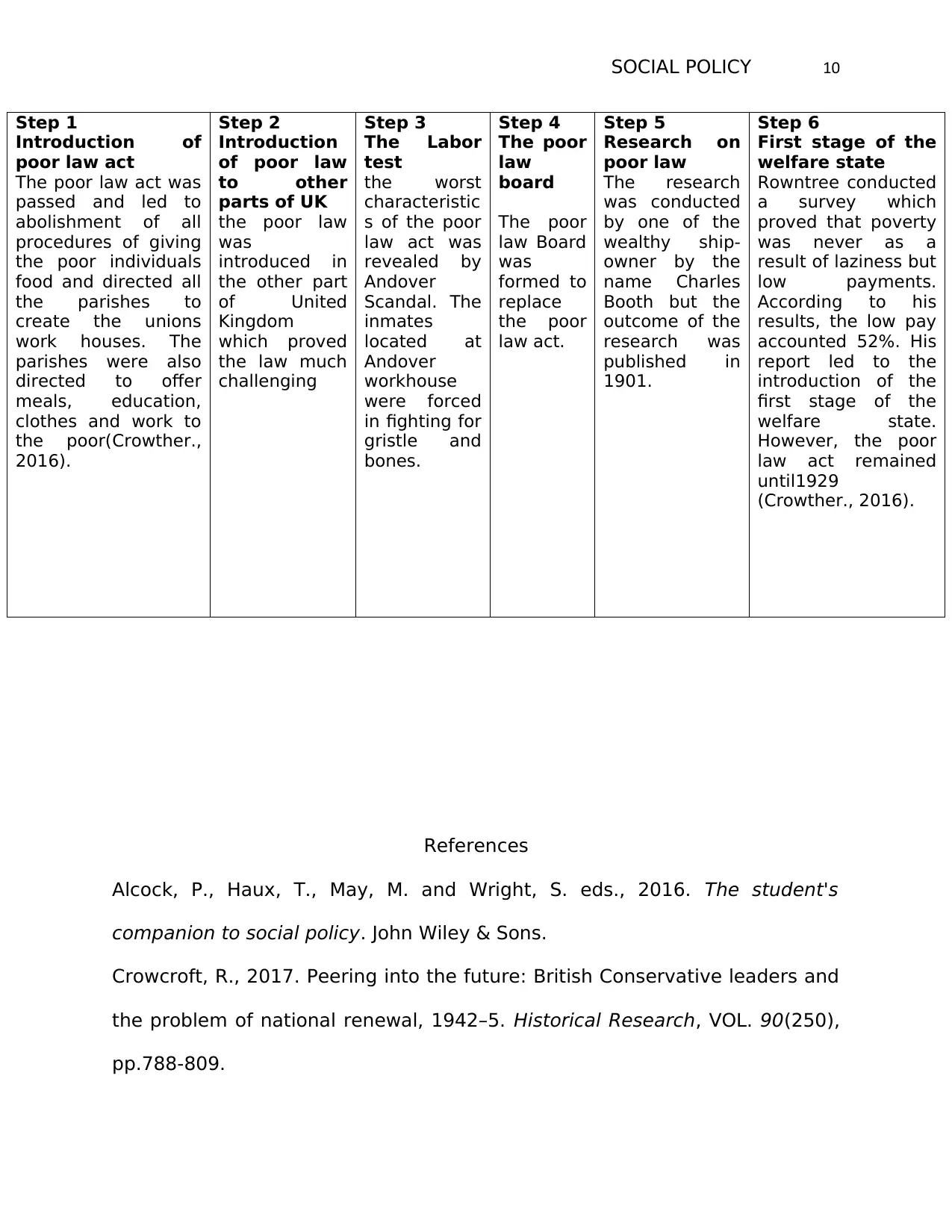
SOCIAL POLICY 10
Step 1
Introduction of
poor law act
The poor law act was
passed and led to
abolishment of all
procedures of giving
the poor individuals
food and directed all
the parishes to
create the unions
work houses. The
parishes were also
directed to offer
meals, education,
clothes and work to
the poor(Crowther.,
2016).
Step 2
Introduction
of poor law
to other
parts of UK
the poor law
was
introduced in
the other part
of United
Kingdom
which proved
the law much
challenging
Step 3
The Labor
test
the worst
characteristic
s of the poor
law act was
revealed by
Andover
Scandal. The
inmates
located at
Andover
workhouse
were forced
in fighting for
gristle and
bones.
Step 4
The poor
law
board
The poor
law Board
was
formed to
replace
the poor
law act.
Step 5
Research on
poor law
The research
was conducted
by one of the
wealthy ship-
owner by the
name Charles
Booth but the
outcome of the
research was
published in
1901.
Step 6
First stage of the
welfare state
Rowntree conducted
a survey which
proved that poverty
was never as a
result of laziness but
low payments.
According to his
results, the low pay
accounted 52%. His
report led to the
introduction of the
first stage of the
welfare state.
However, the poor
law act remained
until1929
(Crowther., 2016).
References
Alcock, P., Haux, T., May, M. and Wright, S. eds., 2016. The student's
companion to social policy. John Wiley & Sons.
Crowcroft, R., 2017. Peering into the future: British Conservative leaders and
the problem of national renewal, 1942–5. Historical Research, VOL. 90(250),
pp.788-809.
Step 1
Introduction of
poor law act
The poor law act was
passed and led to
abolishment of all
procedures of giving
the poor individuals
food and directed all
the parishes to
create the unions
work houses. The
parishes were also
directed to offer
meals, education,
clothes and work to
the poor(Crowther.,
2016).
Step 2
Introduction
of poor law
to other
parts of UK
the poor law
was
introduced in
the other part
of United
Kingdom
which proved
the law much
challenging
Step 3
The Labor
test
the worst
characteristic
s of the poor
law act was
revealed by
Andover
Scandal. The
inmates
located at
Andover
workhouse
were forced
in fighting for
gristle and
bones.
Step 4
The poor
law
board
The poor
law Board
was
formed to
replace
the poor
law act.
Step 5
Research on
poor law
The research
was conducted
by one of the
wealthy ship-
owner by the
name Charles
Booth but the
outcome of the
research was
published in
1901.
Step 6
First stage of the
welfare state
Rowntree conducted
a survey which
proved that poverty
was never as a
result of laziness but
low payments.
According to his
results, the low pay
accounted 52%. His
report led to the
introduction of the
first stage of the
welfare state.
However, the poor
law act remained
until1929
(Crowther., 2016).
References
Alcock, P., Haux, T., May, M. and Wright, S. eds., 2016. The student's
companion to social policy. John Wiley & Sons.
Crowcroft, R., 2017. Peering into the future: British Conservative leaders and
the problem of national renewal, 1942–5. Historical Research, VOL. 90(250),
pp.788-809.
Paraphrase This Document
Need a fresh take? Get an instant paraphrase of this document with our AI Paraphraser
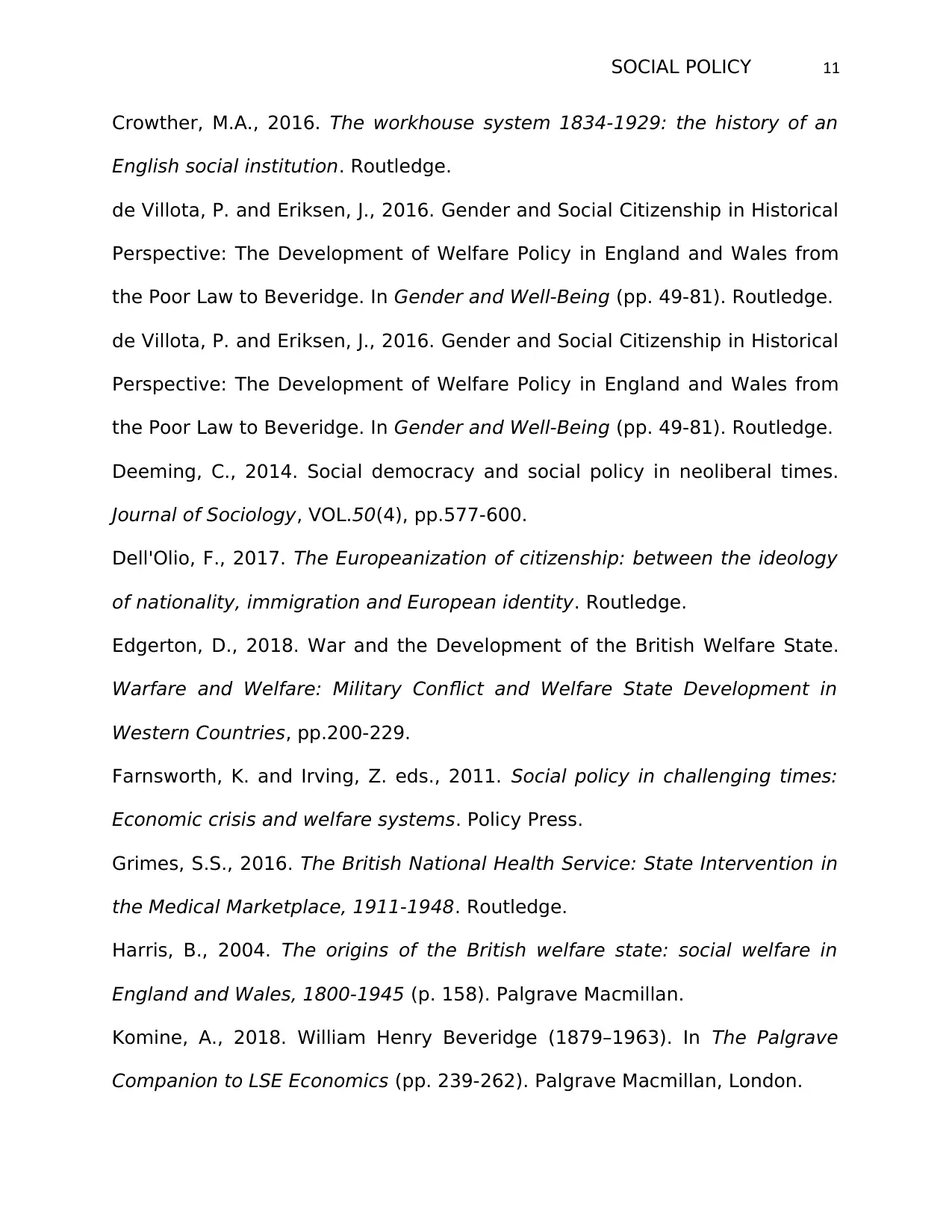
SOCIAL POLICY 11
Crowther, M.A., 2016. The workhouse system 1834-1929: the history of an
English social institution. Routledge.
de Villota, P. and Eriksen, J., 2016. Gender and Social Citizenship in Historical
Perspective: The Development of Welfare Policy in England and Wales from
the Poor Law to Beveridge. In Gender and Well-Being (pp. 49-81). Routledge.
de Villota, P. and Eriksen, J., 2016. Gender and Social Citizenship in Historical
Perspective: The Development of Welfare Policy in England and Wales from
the Poor Law to Beveridge. In Gender and Well-Being (pp. 49-81). Routledge.
Deeming, C., 2014. Social democracy and social policy in neoliberal times.
Journal of Sociology, VOL.50(4), pp.577-600.
Dell'Olio, F., 2017. The Europeanization of citizenship: between the ideology
of nationality, immigration and European identity. Routledge.
Edgerton, D., 2018. War and the Development of the British Welfare State.
Warfare and Welfare: Military Conflict and Welfare State Development in
Western Countries, pp.200-229.
Farnsworth, K. and Irving, Z. eds., 2011. Social policy in challenging times:
Economic crisis and welfare systems. Policy Press.
Grimes, S.S., 2016. The British National Health Service: State Intervention in
the Medical Marketplace, 1911-1948. Routledge.
Harris, B., 2004. The origins of the British welfare state: social welfare in
England and Wales, 1800-1945 (p. 158). Palgrave Macmillan.
Komine, A., 2018. William Henry Beveridge (1879–1963). In The Palgrave
Companion to LSE Economics (pp. 239-262). Palgrave Macmillan, London.
Crowther, M.A., 2016. The workhouse system 1834-1929: the history of an
English social institution. Routledge.
de Villota, P. and Eriksen, J., 2016. Gender and Social Citizenship in Historical
Perspective: The Development of Welfare Policy in England and Wales from
the Poor Law to Beveridge. In Gender and Well-Being (pp. 49-81). Routledge.
de Villota, P. and Eriksen, J., 2016. Gender and Social Citizenship in Historical
Perspective: The Development of Welfare Policy in England and Wales from
the Poor Law to Beveridge. In Gender and Well-Being (pp. 49-81). Routledge.
Deeming, C., 2014. Social democracy and social policy in neoliberal times.
Journal of Sociology, VOL.50(4), pp.577-600.
Dell'Olio, F., 2017. The Europeanization of citizenship: between the ideology
of nationality, immigration and European identity. Routledge.
Edgerton, D., 2018. War and the Development of the British Welfare State.
Warfare and Welfare: Military Conflict and Welfare State Development in
Western Countries, pp.200-229.
Farnsworth, K. and Irving, Z. eds., 2011. Social policy in challenging times:
Economic crisis and welfare systems. Policy Press.
Grimes, S.S., 2016. The British National Health Service: State Intervention in
the Medical Marketplace, 1911-1948. Routledge.
Harris, B., 2004. The origins of the British welfare state: social welfare in
England and Wales, 1800-1945 (p. 158). Palgrave Macmillan.
Komine, A., 2018. William Henry Beveridge (1879–1963). In The Palgrave
Companion to LSE Economics (pp. 239-262). Palgrave Macmillan, London.
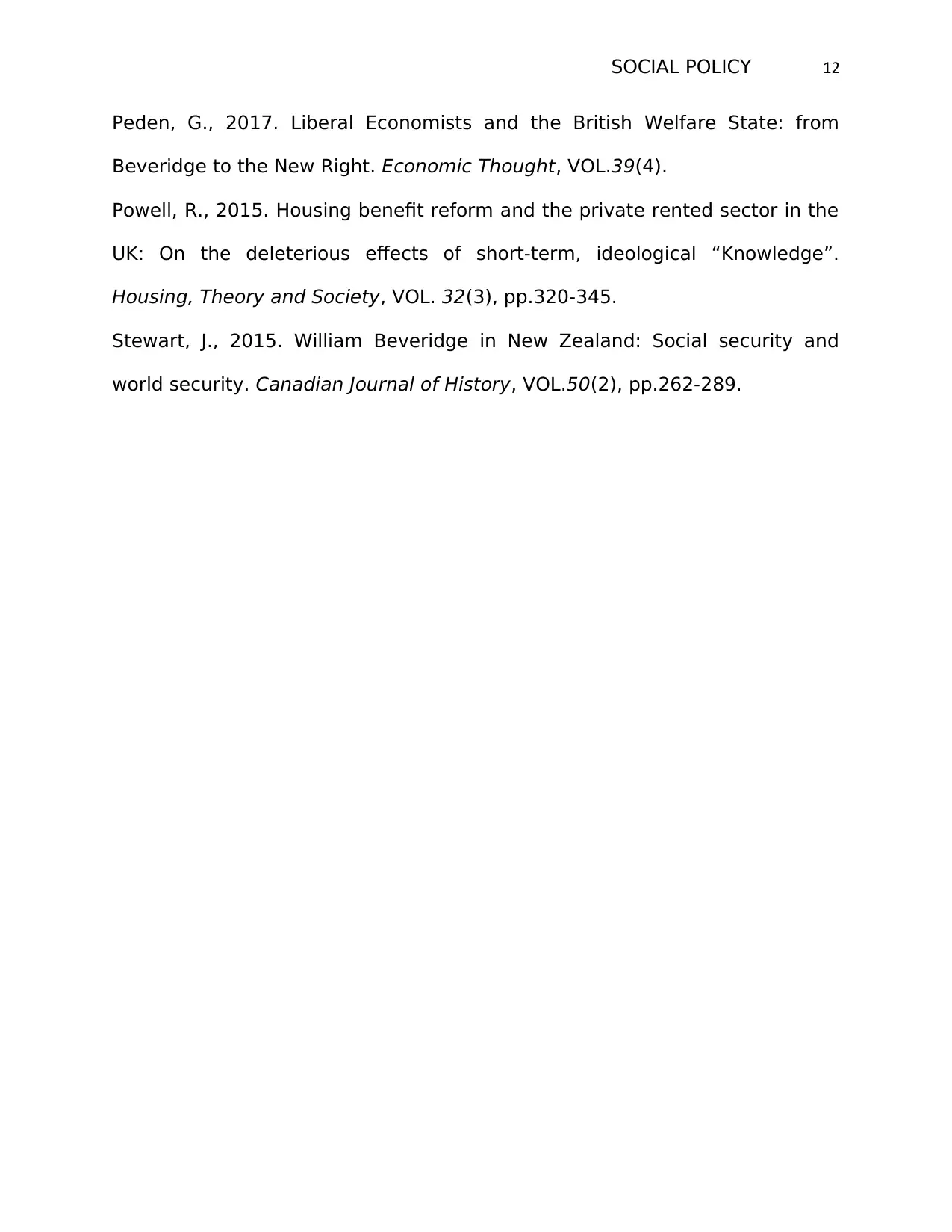
SOCIAL POLICY 12
Peden, G., 2017. Liberal Economists and the British Welfare State: from
Beveridge to the New Right. Economic Thought, VOL.39(4).
Powell, R., 2015. Housing benefit reform and the private rented sector in the
UK: On the deleterious effects of short-term, ideological “Knowledge”.
Housing, Theory and Society, VOL. 32(3), pp.320-345.
Stewart, J., 2015. William Beveridge in New Zealand: Social security and
world security. Canadian Journal of History, VOL.50(2), pp.262-289.
Peden, G., 2017. Liberal Economists and the British Welfare State: from
Beveridge to the New Right. Economic Thought, VOL.39(4).
Powell, R., 2015. Housing benefit reform and the private rented sector in the
UK: On the deleterious effects of short-term, ideological “Knowledge”.
Housing, Theory and Society, VOL. 32(3), pp.320-345.
Stewart, J., 2015. William Beveridge in New Zealand: Social security and
world security. Canadian Journal of History, VOL.50(2), pp.262-289.
⊘ This is a preview!⊘
Do you want full access?
Subscribe today to unlock all pages.

Trusted by 1+ million students worldwide
1 out of 12
Related Documents
Your All-in-One AI-Powered Toolkit for Academic Success.
+13062052269
info@desklib.com
Available 24*7 on WhatsApp / Email
![[object Object]](/_next/static/media/star-bottom.7253800d.svg)
Unlock your academic potential
Copyright © 2020–2026 A2Z Services. All Rights Reserved. Developed and managed by ZUCOL.





